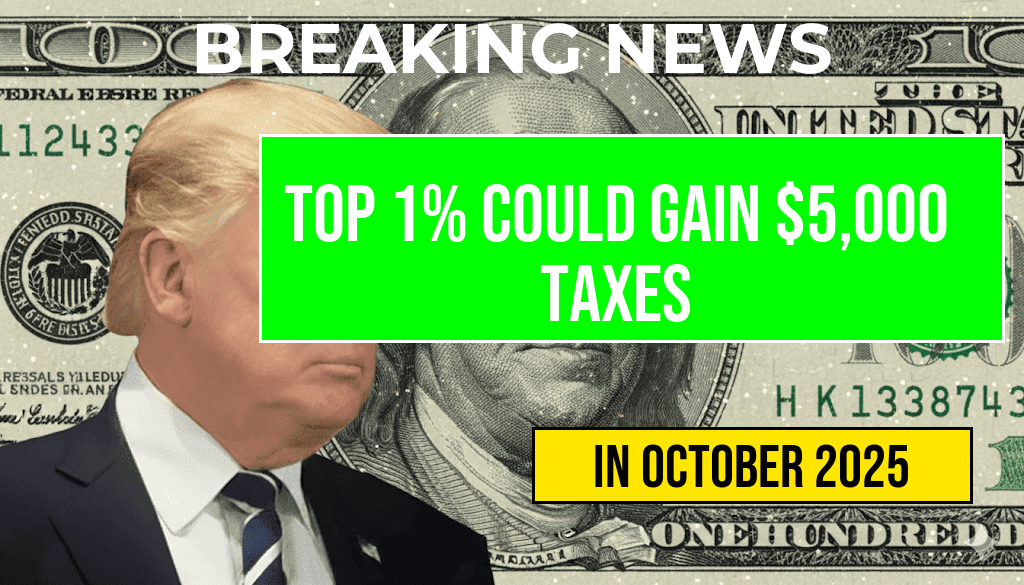Recent proposed changes to tax policies could significantly impact the net income of the United States’ wealthiest Americans. According to financial analysts and government reports, members of the top 1% may see an average increase of approximately $5,000 in their annual net income due to adjustments in tax rates and deductions. These changes are part of broader efforts to recalibrate the tax code, aiming to enhance revenue and promote economic fairness while sparing high-net-worth individuals from substantial taxation hikes. The potential boost in net income is primarily driven by modifications to capital gains taxes, estate taxes, and itemized deductions, which could benefit the wealthiest earners, many of whom rely heavily on investment income and wealth preservation strategies.
Understanding the Proposed Tax Adjustments
The Scope of the Changes
The upcoming tax reforms are expected to focus on several key areas:
- Capital Gains Tax Rates: Adjustments to long-term capital gains rates for high-income earners could reduce the effective tax burden on investment profits, directly influencing the net income of the wealthy.
- Estate Tax Thresholds: Increasing exemptions and modifying estate tax rates might allow heirs of wealthy families to retain more of their inherited assets, effectively increasing their net worth.
- Itemized Deductions and Credits: Revisions to deductions—such as mortgage interest, charitable contributions, and state and local tax (SALT) deductions—could favor high-income households, resulting in lower taxable income.
Projected Financial Impact
Analysts estimate that these combined modifications could lead to an average net income increase of around $5,000 for the top 1% of earners. While this figure varies based on individual financial structures, it underscores a trend where tax policy shifts might inadvertently benefit high-net-worth individuals more than initially intended. For comparison, the median household in the U.S. earns significantly less, emphasizing the targeted nature of these reforms.
Implications for Wealth Inequality and Economic Policy
Potential for Narrowing or Widening Gaps
Some experts argue that such tax adjustments could mitigate wealth disparities by easing the tax burden on the affluent, thereby encouraging continued investment and economic activity among this group. Conversely, critics contend that these changes may exacerbate income inequality, as low- and middle-income households might not receive similar benefits, and the revenue generated from increased taxes on the wealthy could be insufficient to fund social programs.
Government Revenue and Public Services
The anticipated increase in net income for the top 1% could influence federal revenue projections. While the reforms aim to generate additional funds, the actual impact depends on compliance, economic growth responses, and changes in investment behaviors. According to Wikipedia’s overview of U.S. tax policy, balancing tax incentives with revenue needs remains a complex challenge for policymakers.
Expert Perspectives and Future Outlook
Financial Analysts’ Views
Many financial experts acknowledge that while the proposed reforms might provide short-term benefits to the wealthy, the broader economic effects remain uncertain. Some suggest that increased disposable income among high earners could stimulate investment and consumption, potentially spurring economic growth. Others warn that if the reforms are perceived as favoring the rich, it could lead to political pushback and legislative gridlock.
Policy Development and Legislative Process
The final shape of the tax reforms will depend on negotiations within Congress. Lawmakers are weighing the trade-offs between revenue targets and political support, with some advocating for more progressive taxation, while others emphasize maintaining incentives for high-income earners. The outcome will influence not only the net income of the wealthy but also the broader fiscal landscape.
Summary Table: Key Elements of the Tax Changes
| Area | Current Policy | Proposed Change | Expected Effect |
|---|---|---|---|
| Capital Gains Tax | 20% for high-income earners | Potential reduction or restructuring | Lower effective tax rate, increasing net income |
| Estate Tax | Exemption around $12 million | Increased exemption thresholds | Higher inheritance retention, boosting net worth |
| Deductions & Credits | Various itemized deductions available | Revised limits and caps | More favorable treatment for top earners |
As the legislative process unfolds, the final impact on the wealthiest Americans remains to be seen. However, current projections suggest that some of the most affluent could see an increase in their net income by around $5,000 annually, shaping the financial landscape for high-net-worth households in the near future. For further insights into the evolving tax policies, consult resources such as Forbes and the Wikipedia overview of U.S. tax policy.
Frequently Asked Questions
What is the main impact of recent tax changes on the wealthiest Americans?
The recent tax changes could result in the top 1% of Americans experiencing an average $5,000 increase in net income.
Who are considered the wealthiest Americans affected by these changes?
The wealthiest Americans in the Top 1% are primarily those with the highest net worth and income levels who will benefit from the new tax policies.
How might these tax changes influence the overall economy?
The increase in net income for the top 1% could potentially lead to increased investment and spending, impacting economic growth.
Are there any specific tax policies contributing to this income increase?
Yes, certain tax reforms aimed at reducing tax burdens on high-income earners are responsible for the projected $5,000 increase in net income.
Will middle and lower-income Americans see similar benefits from these tax changes?
No, these tax changes primarily favor the top 1%, and middle or lower-income Americans are not expected to experience similar income increases.






